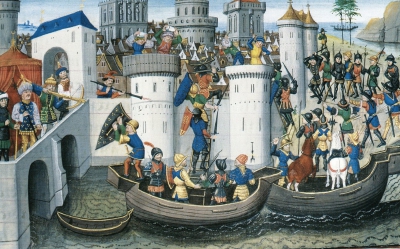The siege of Zara or siege of Zadar (Croatian: Opsada Zadra; Hungarian: Zra ostroma; 1024 November 1202) was the first major action of the Fourth Crusade and the first attack against a Catholic city by Catholic crusaders. The crusaders had an agreement with Venice for transport across the sea, but the price far exceeded what they were able to pay. Venice set the condition that the crusaders help them capture Zadar (or Zara), a constant battleground between Venice on one side and Croatia and Hungary on the other, whose king, Emeric, pledged himself to join the Crusade. Although some of the crusaders refused to take part in the siege, the attack on Zadar began in November 1202 despite letters from Pope Innocent III forbidding such an action and threatening excommunication. Zadar fell on 24 November and the Venetians and the crusaders sacked the city. After wintering in Zadar, the Fourth Crusade continued its campaign, which led to the siege of Constantinople.
The Fourth Crusade (1202–1204) was a Latin Christian armed expedition called by Pope Innocent III. The stated intent of the expedition was to recapture the Muslim-controlled city of Jerusalem, by first defeating the powerful Egyptian Ayyubid Sultanate, the strongest Muslim state of the time. However, a sequence of economic and political events culminated in the Crusader army's 1204 sack of Constantinople, the capital of the Greek Christian-controlled Byzantine Empire, rather than Egypt as originally planned. This led to the partitioning of the Byzantine Empire.
In exchange for building a dedicated fleet and providing sea transport, the Republic of Venice set the condition that the Crusaders help them capture Zadar (or Zara), on the Adriatic Sea. This led in November 1202 to the siege and sack of Zara, the first attack against a Catholic city by a Catholic Crusader army. The city was then brought under Venetian control. When the Pope heard of this, he excommunicated the Crusader army. In January 1203, en route to Jerusalem, the Crusader leadership entered into an agreement with the Byzantine prince Alexios Angelos to divert the Crusade to Constantinople and restore his deposed father Isaac II Angelos as emperor. The intent of the Crusaders was then to continue to Jerusalem with promised Byzantine financial and military aid. On 23 June 1203, the main Crusader army reached Constantinople, while other contingents (perhaps a majority of all crusaders) continued to Acre.
In August 1203, following the siege of Constantinople, Alexios was crowned co-emperor. However, in January 1204 he was deposed by a popular uprising. The Crusaders were no longer able to receive their promised payments from Alexios. Following the murder of Alexios on 8 February, the Crusaders decided on the outright conquest of the city. In April 1204, they captured and plundered the city's enormous wealth. Only a handful of the Crusaders continued to the Holy Land thereafter.
The conquest of Constantinople was followed by the fragmentation of the Byzantine Empire into three states centered in Nicaea, Trebizond and Epirus. The Crusaders then founded several new Crusader states, known as Frankokratia, in former Byzantine territory, largely hinged upon the Latin Empire of Constantinople. The presence of the Latin Crusader states almost immediately led to war with the Byzantine successor states and with the Bulgarian Empire. The Nicaean Empire eventually recovered Constantinople and restored the Byzantine Empire in 1261.
The Fourth Crusade is considered to have solidified the East–West Schism. The crusade dealt an irrevocable blow to the Byzantine Empire, contributing to its decline and fall.

 English
English  español
español  français
français  português
português  русский
русский  العربية
العربية  简体中文
简体中文 
